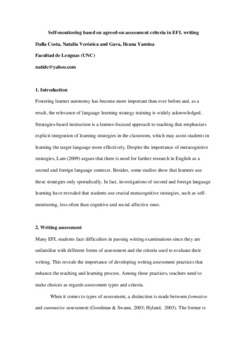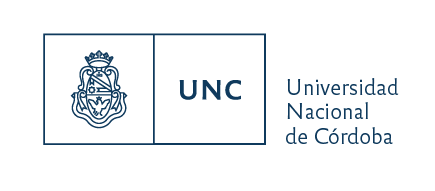| dc.contributor.author | Dalla Costa, Natalia Verónica | |
| dc.contributor.author | Gava, Ileana Yamina | |
| dc.date.accessioned | 2022-11-07T15:20:30Z | |
| dc.date.available | 2022-11-07T15:20:30Z | |
| dc.date.issued | 2015 | |
| dc.identifier.isbn | 978-987-45982-0-2 | |
| dc.identifier.uri | http://hdl.handle.net/11086/29429 | |
| dc.description.abstract | Learner autonomy has become a very important aspect of English Language Teaching and, as a result, the relevance of language learning strategy training to foster learners' autonomous behaviour is now widely acknowledged. Strategies-based instruction is a learner-focused approach to teaching that emphasizes explicit integration of learning strategies in the classroom, which may assist students in learning the target language more effectively. Despite the importance of metacognitive strategies, the number of studies in English as a foreign and second language contexts still remains small. Besides, some studies show that learners use these strategies only sporadically. In fact, investigations of second and foreign language learning have revealed that students use crucial metacognitive strategies, such as self-monitoring, less often than cognitive and social affective ones. The current study, carried out with EFL university students at an upper-intermediate level in an English Language II class in the teacher training, translation and licentiate programs at the School of Languages, UNC, examines the effects of metacognitive strategy training on the writing skill. Its general objective is to determine whether scaffolding metacognitive strategy use by means of guidelines for self-monitoring based on agreed-on assessment criteria leads to positive changes in students' self-perceptions and to observable strategy use in their essays. It is expected that metacognitive strategy training and use will eventually lead to improved performance in EFL academic writing, a better understanding of teachers? assessment criteria and greater learner autonomy. The outcome of this project will be used to outline more comprehensive research that provides training in a wider range of strategies aimed at enhancing academic writing skills and promoting learner autonomy. This study concludes with limitations, pedagogical implications and avenues for further research. | es |
| dc.description.uri | http://www.faapi.org.ar/downloads/FAAPI2015.pdf | |
| dc.format.medium | Electrónico y/o Digital | |
| dc.language.iso | eng | es |
| dc.rights | Attribution-NonCommercial-ShareAlike 4.0 International | * |
| dc.rights.uri | http://creativecommons.org/licenses/by-nc-sa/4.0/ | * |
| dc.subject | Self-monitoring | es |
| dc.subject | Learner autonomy | es |
| dc.subject | Agreed-on assessment criteria | es |
| dc.subject | EFL writing | es |
| dc.title | Self-monitoring based on agreed-on assessment criteria in EFL writing | es |
| dc.type | conferenceObject | es |
| dc.description.fil | Fil: Dalla Costa, Natalia Verónica. Universidad Nacional de Córdoba. Facultad de Lenguas; Argentina. | es |
| dc.description.fil | Fil: Gava, Ileana Yamina. Universidad Nacional deCórdoba. Fcultad de Lenguas; Argentina. | es |
| dc.description.field | Lingüística | |
| dc.conference.city | Córdoba | |
| dc.conference.country | Argentina | |
| dc.conference.editorial | ACPI - Asociación Cordobesa de Profesores de Inglés | |
| dc.conference.event | 40to. Congreso Anual de Profesores de Inglés. 40th FAAPI Annual Conference in Córdoba:"EFL Classrooms in the New Millennium: Local Developments and Global Concerns | |
| dc.conference.eventcity | Córdoba | |
| dc.conference.eventcountry | Argentina | |
| dc.conference.eventdate | 2015-9 | |
| dc.conference.institution | FAAPI - Federación Argentina de Asociaciones de Profesores de Inglés | |
| dc.conference.journal | EFL Classrooms in the New Millennium: selected papers from the 40th FAAPI Conference | |
| dc.conference.publication | Libro | |
| dc.conference.work | Artículo Completo | |
| dc.conference.type | Congreso | |





